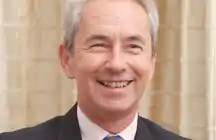Richard Stagg
Sir Richard Stagg KCMG (born 27 September 1955) is a retired British diplomat who was ambassador to Bulgaria, high commissioner to India and ambassador to Afghanistan.
Sir Richard Stagg KCMG | |
|---|---|
 | |
| British Ambassador to Afghanistan | |
| In office 2012–2015 | |
| Monarch | Elizabeth II |
| Prime Minister | David Cameron |
| Preceded by | Sir William Patey |
| Succeeded by | Dame Karen Pierce |
| British High Commissioner to India | |
| In office 2007–2011 | |
| Monarch | Elizabeth II |
| Prime Minister | Gordon Brown David Cameron |
| Preceded by | Sir Michael Arthur |
| Succeeded by | Sir James Bevan |
| Personal details | |
| Born | 27 September 1955 |
| Nationality | British |
| Children | 5 |
| Education | Winchester College |
| Alma mater | Oriel College, Oxford |
| Occupation | Diplomat |
Education
Charles Richard Vernon Stagg was educated at Winchester College and Oriel College, Oxford where he read history.
Career
On joining the British Foreign Office, Stagg worked in the Department responsible for Hong Kong – on his second day the Hong Kong Police mutinied, adding to the challenge of managing Britain’s last major overseas territory.
He then spent three years in Bulgaria, and a further three years in the Netherlands at a time when the country was in uproar over the planned deployment of US missiles.
Stagg was then seconded to the Secretariat of the European Council to help establish a new organisation designed to coordinate more effectively the foreign policy of the members of the European Union. He returned to London to work on policy towards the Soviet Union in the three years leading up to its collapse and the liberation of Eastern Europe – the goal of British policy for the previous four decades.
After two years as British Press Spokesman in Brussels during the Maastricht negotiations (which led to a landmark treaty paving the way for the Euro), he became a Private Secretary to the British Foreign Secretary Douglas Hurd.
From 1996–1998 Stagg was head of the Foreign Office Department responsible for the Enlargement of the EU – negotiations with 10 candidate countries were started in early 1998 under the UK’s Presidency of the Council of the EU.
Stagg was appointed British Ambassador to Bulgaria in 1998 and served there for three years during the war over the future of Kosovo.
Between 2001 and 2007 Stagg was responsible for the Foreign Office’s global consular, visa and information work; and for the global estate, IT and HR. He was a member of the Foreign Office's management board from 2002 to 2007.
Stagg was British High Commissioner to India from 2007 to 2011,[1] and Ambassador to Afghanistan from April 2012 until he retired in early 2015.[2]
In September 2019 he took up the post of Warden of Winchester College, chairing its board of governors.[3]
Personal life
Stagg is married with five children - 3 sons and 2 daughters.
References
![]() This article incorporates text published under the British Open Government Licence v2.0: British Ambassador to Afghanistan: Sir Richard Stagg at the Wayback Machine (archived 19 August 2014)
This article incorporates text published under the British Open Government Licence v2.0: British Ambassador to Afghanistan: Sir Richard Stagg at the Wayback Machine (archived 19 August 2014)
- STAGG, Sir (Charles) Richard (Vernon), Who's Who 2012, A & C Black, 2012; online edn, Oxford University Press, Dec 2011, accessed 26 Oct 2012
- "Change of Her Majesty's Ambassador to Afghanistan". Government of the United Kingdom. 20 December 2011. Retrieved 16 July 2017.
- Change of Her Majesty’s Ambassador to Afghanistan – Foreign & Commonwealth Office, 24 March 2015
- "Winchester College appoints 48thWardento chair its Governing Body". Winchester College Society. Winchester College. Retrieved 4 April 2019.
External links
| Wikimedia Commons has media related to Richard Stagg. |
- Afghanistan should be left 'to get on with things' – British ambassador, The Guardian, London, 2 October 2012
| Diplomatic posts | ||
|---|---|---|
| Preceded by Roger Short |
Ambassador to Bulgaria 1998–2001 |
Succeeded by Ian Soutar |
| Preceded by Sir Michael Arthur |
High Commissioner to India 2007–2011 |
Succeeded by Sir James Bevan |
| Preceded by Sir William Patey |
Ambassador to Afghanistan 2012–2015 |
Succeeded by Dame Karen Pierce |